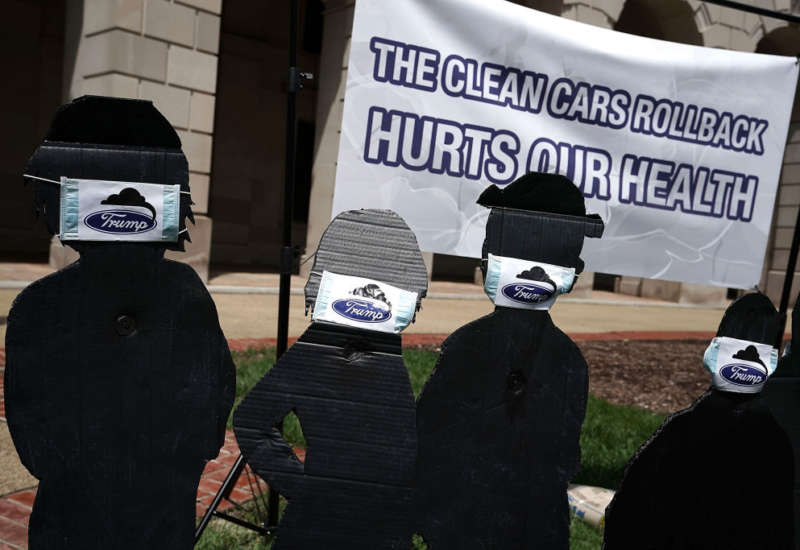The climate crisis affected our daily lives in a painful way this summer, exacerbating long-standing inequalities that harm our communities. Millions of Americans have had to swelter in heat waves, evacuate their homes in the face of onrushing wildfires or hurricanes, or bail out flooded homes. The latest report from the Intergovernmental Panel on Climate Change sounds the climate alarm louder than ever: The damage done by burning fossil fuels will only worsen unless we rapidly slash climate-disrupting emissions. To make transformative change to the transportation sector, the largest contributor to emissions in the U.S., the federal government must issue strong and enforceable standards.
The Biden administration is about to finalize new clean car standards, taking action to reverse Trump-era attacks which severely weakened the standards, and giving the U.S. back one of its strongest tools to combat the climate crisis and protect the health of Black, Latinx, low-income, and other marginalized people. The new standards could push manufacturers to produce fewer gas-guzzling vehicles as soon as next year.
Finalized in 2012 by then-President Barack Obama, these climate and clean air protections were shredded by former President Donald Trump. Clean car standards not only reduce emissions from cars and light trucks; they also cut down on vehicle pollution, improving air quality, especially in Black and Brown communities torn up by highways in the name of “urban renewal.” Further — take note, Republicans who blame the high price of gas on climate action — clean car standards actually save us money at the pump by increasing fuel efficiency.
But the Environmental Protection Agency’s (EPA) proposal falls short in meeting the urgency of the moment. It is far too weak to achieve the climate progress we need, and it contains loopholes that would allow auto manufacturers to continue to double down on gas-guzzling vehicles. In their current state, these standards would result in much less pollution reduction than the auto industry agreed to in 2012 — nearly a decade ago — and undermine President Joe Biden’s own commitments around climate, public health and racial justice.
The health of our climate and communities depends on the administration making drastic improvements to the final rule and setting us on a path to 100 percent electric vehicle sales by 2035. The EPA’s proposal is simply not in line with the scale and pace of climate action demanded by today’s realities. The Biden administration’s final clean car standards should reflect everything we’ve learned since President Obama’s proposal about how brutal the climate crisis can be, and how imperative it is that we do everything we can to stop it.
On the flip side, the economic benefits of climate action were also less clear in 2012 than they are today. Most of us didn’t foresee how fast clean car technologies would evolve, making it easier for automakers to meet the standards we need. It was even harder to imagine a future where major automakers — which spent decades stymieing climate action — embraced electric vehicles. If the Biden administration puts out stronger clean car standards, automakers must respond by investing in cleaner vehicles. That would create millions of good unionized jobs — the kinds of jobs that offered generations of Americans more economic security.
Clean car standards actually save us money at the pump by increasing fuel efficiency.
One thing that was abundantly clear in 2012 is the fact that car exhaust contained pollutants that harmed our health and increased rates of asthma and other respiratory diseases — particularly in communities of color. When it comes to the history of transportation in the U.S., racism has helped determine where highways are situated, and who has the financial resources to escape the pollution they bring with them.
It has taken our leaders too many years to even acknowledge the disproportionate environmental harms faced by Black and Brown people. President Biden has pledged that addressing environmental racism is a central part of his presidency. It’s time for EPA to finalize clean car standards that slash vehicle pollution while charting a rapid transition to pollution-free electric vehicles that will save Black and Brown lives.
President Biden says he understands that this is an extraordinary moment in human history that demands bold action, not incremental change. The EPA has an opportunity to make up for decades of inaction and predatory delay by offering the country an improved tool to combat the climate crisis and ensure that everyone breathes clean air. As people around the country mobilize for stronger clean car safeguards, we hope the EPA will keep in mind a question posed by activist Grace Lee Boggs: “What time is it on the clock of the world?”
We’re not sure we know. But we’re pretty certain it’s not “2012.”
The public comment deadline for the EPA rulemaking is September 27, and anyone can submit comments here and here.


